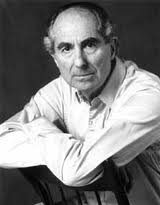
Why did he quit reading fiction?
“I wised up,” Roth says.
The word choice is troubling, for it suggests that he now views fiction as some kind of scam or, at best, a frivolity that diverts intellectual attention from worthier endeavors. I dearly wish Roth’s interviewer, Jan Dalley, the Arts Editor of The Financial Times, would have drawn him out more on this. Although it appears that Roth still believes in writing fiction, he apparently no longer believes in reading it.
Regardless what one thinks of Roth—and I’m well aware that many judge him intolerable—the fact that a novelist of his stature would imply that fiction is no longer worth reading should give everyone pause.
To me, what Roth said is incomprehensible.
More than most contemporary writers, Roth’s work overtly converses with Literature, both challenging and paying homage to the very concept of fiction.
Consider, for example, some of the novels he’s published within the last five years:
Everyman, which won the Pen/Faulkner Award in 2007, is a modern update on the medieval morality play of the same name.
Exit Ghost (titled after a Shakespearean stage direction) riffs on Joseph Conrad’s 1916 novella, The Shadow-Line, and Roth’s own The Ghost Writer (in which the legacy of Anne Frank and her diary play a crucial role).
In Indignation, his 2008 novel depicting American life during the Korean War, the central character rebels after reading a Bertrand Russell essay. The novel itself is mostly set in Winesburg, Ohio—in homage Sherwood Anderson’s story collection.
Even in the minutia of Roth’s sentences, one finds references to other literary works.
Here is Roth describing the mounting Korean War causalities from the vantage of a football-obsessed American college student:
“Four thousand young men like yourselves, dead, maimed, and wounded, between the time we beat Bowling Green and the time we upset UWV.” (Indignation, p. 218)
Now check out Tadeusz Borowski, who describes the mounting executions in a Nazi concentration camp from the vantage of a soccer-obsessed prison guard:
“Between two throw-ins in a soccer game, right behind my back, three thousand people had been put to death.” (This Way for the Gas, Ladies and Gentlemen, p. 84)
[Roth edited Borowski’s This Way for the Gas… while overseeing Penguin’s Writers from the Other Europe series in the 1970s & 80s. Through that Penguin series, Roth helped introduce American readers to a number of important East European writers, including Milan Kundera, Bruno Schulz, Danilo Kis, and Witold Gombrowicz].
As literary critic Elaine Showalter points out, Nemesis, Roth’s most recent novel, “is a brilliant and compassionate American re-imagining of Albert Camus’s fable, The Plague.”
The literary allusions do not necessarily mean these are great novels (reviewers, after all, have not been abundantly kind in their appraisal of them), but it is fair to say that the allusions indicate that Roth conceptualizes his creations through the lens of literary references. That’s why it surprises me that he no longer wishes to avail himself to reading fiction—it’s almost as if he’s exiling himself from the stream that has nourished his creative mind for the past five decades.
Elsewhere, it’s been implied that dwindling mental alertness is responsible for Roth’s inability to read fiction nowadays, but that strikes me as a wildly inappropriate conjecture—and one seemingly at odds with the otherwise alert and thoughtful man that Roth is portrayed as being in Dalley’s interview. No doubt others will read into Roth’s words a note of regret for the years he has devoted toward reading and writing fiction, but evidence of that regret is also absent in Dalley’s article.
In a 1993 New York Times interview, Roth addressed the perceived decline:
"I don't think there's a decline of the novel so much as the decline of the readership," Roth said, mounting what he admitted was a favorite hobbyhorse. "There's been a drastic decline, even a disappearance, of a serious readership. That's inescapable.”
In that same interview, Roth conjectured that only 120,000 serious readers remained in this country.
I have no idea how accurate Roth’s guess might have been, or whether Roth ever updated that count. However, it now appears that we have one less serious reader of fiction than we used to have. For all of our sake, I hope it is only a temporary loss.
 RSS Feed
RSS Feed
